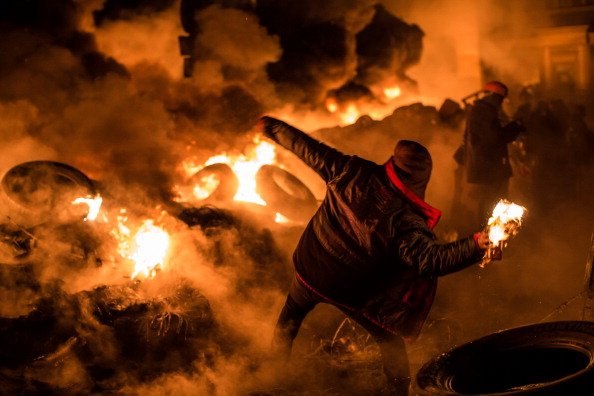John Humphrys asks: how should the West react to civil unrest in Ukraine?
Ukraine looks to be standing on the very edge of civil war. This week dozens, if not hundreds, of protestors in the capital, Kiev, have been killed and many more injured, as police have fired live ammunition at them. Many policemen too have been killed and injured. Units of the army are reported to be heading for the capital.
Numerous attempts to broker a deal that would end the violence have broken down. The latest, mediated by three EU foreign ministers during all-night negotiations on Thursday, may have more success or it too may founder under the pressure of events and the intensifying of animosities. If civil war does break out, how should the West respond?
The internal conflict in Ukraine is about many things, not least public contempt for the government of President Yanukovitch, a government many believe to be riddled with corruption. But at its root there is a much greater, existential question: where does Ukraine wish to belong? Does it wish to stay within the orbit of its long-time dominant partner, Russia, to the east, or look west to the European Union?
For most of its history Ukraine has been used to being a buffer between east and west but during the seventy-year life of the Soviet Union it was very much under Russian control. It was the Soviet Union’s breadbasket; it was also the arena within which many of the major battles in the epic confrontation between Nazi Germany and Soviet Russia took place.
After the collapse of the Soviet Union, Ukraine became an independent and democratic country. But its politics were split between the east and west. In the heavily-industrialised and largely Russian-speaking east, identification with Russia persisted and pro-Russian parties tended to hold sway. In the Ukrainian-speaking west, most politicians wanted to loosen their contact with Moscow and strengthen them with the capitals of the European Union. Elections were fought and won on these lines.
Things came to a head at the end of last year when the government of President Yanukovitch, despite being essential pro-Russian, wanted to strengthen relations with the EU by signing an association and trade deal with it. There was even talk of possible eventual membership of the EU for Ukraine. The logic of closer ties with the EU seems obvious to many Ukrainians, especially the young, as it offers the prospect of a far more prosperous future than continuing to look east. Back in 1990, when the Soviet Union was falling apart, Ukraine’s economy was slightly larger than Poland’s, its neighbour within the Soviet-dominated Warsaw Pact; now the economy of Poland, a member of the EU, is almost three times the size of Ukraine’s.
At the last minute, though, the Russian leader, President Putin persuaded Yanukovitch to abandon the deal with the EU. President Putin is trying to establish a new customs union of his own among the satellite states of the former Soviet Union and wants Ukraine, with its 46 million people, to be a part of it. Some observers see this strategy as a way for Russia almost to recreate a Soviet Union, albeit of a much looser sort, in order to stand up to the economic power of the EU to the west and China to the east. Putin used a mixture a promises and threats to get his way with Yanukovtich: Ukraine’s dependence on Russian energy supplies and on the Russian market for its industrial exports exerted heavy sway.
But many people in the west of Ukraine were outraged at this about-turn and demonstrators occupied Independence Square in Kiev demanding not only that the deal with the EU should proceed but, increasingly, that Yanukovitch himself should go. When riot police attacked the demonstrators at the end of November, many were killed and injured. But the protestors have stayed put and demonstrations have spread to other parts of the country, including in the east. Since then the government has oscillated between trying to strike a deal with the protestors, who want major constitutional reform and early elections, and seeking to defeat them through force (an approach widely believed to be being urged by Moscow). This week has seen the worst intensification of the violence so far. Some protestors are now calling not just for Yanukovitch to go but for his head.
At the time of writing it is not clear exactly what the deal brokered by the foreign ministers of France, Germany and Poland on Thursday night involves nor even whether it will ultimately be endorsed by the protestors. There must be a fear that the antagonisms generated on both sides are now too great for any deal to stick. There is also alarm that President Yanukovitch may change tack yet again and try to involve the army. There are reports that a unit of marines was brought by train to Kiev overnight on Thursday. Whether the army would follow orders to attack its own people, though, is far from clear.
If all attempts at finding a peaceful outcome break down, what should the west do? EU foreign ministers, meeting on Thursday, agreed to impose sanctions, including the refusal of visas and the freezing of foreign-held assets, on government officials involved in the crackdown. But such measures are hardly going to be sufficient to alter events.
No one is proposing armed intervention by European countries (though Russia may take a different view if it believes its interests are threatened in the Crimea, where it has a naval base and where almost 60% of the population are ethnic Russians). This leaves the issue of whether or not the west should consider arming the pro-EU protestors if it comes to civil war.
To many this very question will ring a bell marked ‘Syria’. Some commentators argue that the civil war in Syria has reached its current utterly destructive stand-off only because the west was so reluctant early on to consider arming those who were standing up to the government of President Assad. But the reasons for that reluctance were understandable enough: supplying weapons to anyone in a civil war seems like a guarantee of increasing the violence and the misery. If it comes to it, the same arguments will apply over Ukraine.
In short we are becoming rather too familiar with this conundrum. Perhaps, in the case of Ukraine, a way will be found to turn back from the brink. But if we fail, we shall face the conundrum again. Do we help those who so much want to be part of our peaceful, democratic European home, or do we abandon them to the mercies of state force?
What’s your view? Let us know.










